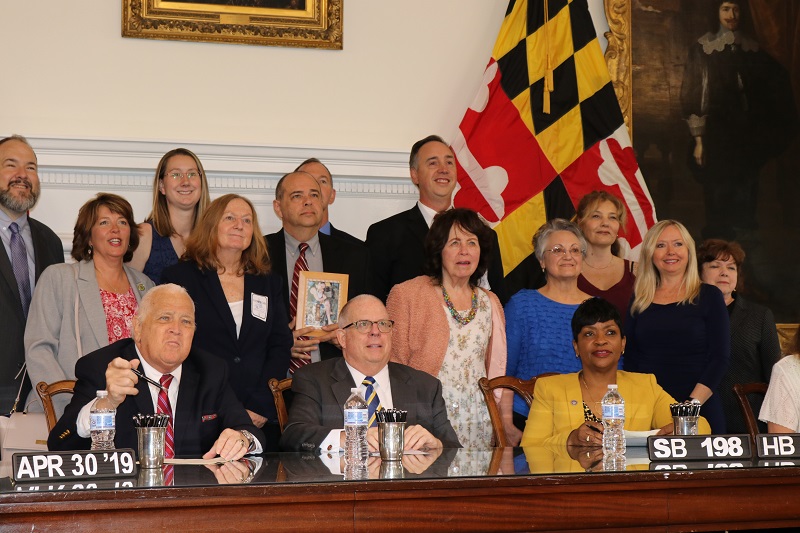174 Bills Signed Into Law, Including Stacey’s Law and Others to Honor Marylanders

Mike Seaton clutched a photo of his daughter, Stacey Lynne, as he walked through the State House on Tuesday morning.
It was taken in the second week of April 2005, just weeks before Stacey Lynne would be shot and killed, steps from her front door in Bowie.
He and his wife, Gale, smiled as Gov. Lawrence J. Hogan Jr. (R) signed into law a bill that will allow prosecutors to charge a person who solicits murder to be found guilty of murder if a death occurs.
Stacey Lynn Seaton was killed in a murder-for-hire scheme, but the man who hired the killer, McDonald Abraham III, was arrested and charged with murder in 2009, too late to prosecute solicitation to commit the 2005 killing.
Abraham later pleaded guilty to second-degree murder and a handgun violation and was sentenced to 15 years in prison, but that didn’t bring peace to Gale Seaton, who was troubled by loopholes in the state’s solicitation law. While most felonies have no statute of limitations, solicitation, which was classified as a misdemeanor, had to be charged within three years.
The bill removes the statute of limitations to charge solicitation if a death occurs since the act would be considered first-degree murder, which has no statute of limitations. First-degree murder carries a possible penalty of life imprisonment.
“I have finally found peace. And justice,” Gale Seaton said outside of the bill-signing ceremony. “If not justice for my daughter, then justice for future victims.”
Mike Seaton looked down at the framed photo of his daughter.
“I just think of everything that was lost,” he said. “What a loss. What a waste of a beautiful life and a beautiful soul.”
Rescuing 9-1-1
A series of bills from Sen. Cheryl Kagan (D-Montgomery) was signed into law to upgrade Maryland’s 9-1-1 emergency call system.
The bills – Senate Bill 5, Senate Bill 284 and Senate Bill 339 – collectively establish the framework and funding for a next-generation 9-1-1 system that will allow for greater compatibility between counties and process all call types, including voice, text, vehicle crash notifications, photos and video.
Senate Bill 5 would require counties to notify victims if they are part of a record that has been requested through the Public Information Act and allows counties to consider the victim’s response when deciding whether to release a record publicly.
Senate Bill 284 replaces references in state law to “9-1-1 public safety telecommunicator” and substitutes “9-1-1 specialist” and encourages counties to compensate 9-1-1 specialists fairly.
Senate Bill 339 contains the bulk of recommendations for creating a next-generation 9-1-1 system and establishes a new fee structure to pay for upgrades.
That bill allows the state and counties to double their portions of 9-1-1 fees to cover new next-generation services. The state’s 25-cent share of a monthly telephone fee will increase to 50 cents on July 1, and counties are authorized to increase their 75-cent share of the fee up to an additional 75 cents to cover operating costs. The bill also imposes the fee on a per-device basis, instead of the current fee, which is imposed only once on a bill no matter the number of lines that receive service.
Fiscal analysts estimated that the fee changes could bring in an additional $53.7 million annually to get the new program up and running.
Fees collected under the law can only be used for maintenance of 9-1-1 systems.

From left, Senate Pres. Thomas V. Mike Miller Jr. (D), Gov. Lawrence J. Hogan Jr. (R) and Speaker Pro Tem Adrienne Jones (D) signed 174 bills into law Tuesday. Photo by Danielle E. Gaines
Senate Bill 339 was named Carl Henn’s law after a Rockville resident and community activist who was struck by lightning in 2010 and didn’t receive immediate medical help because the Montgomery County 9-1-1 center was overrun with calls. Among other changes, a next-generation 9-1-1 system would transfer calls between counties when there is an influx of requests for help.
Carol Henn, Carl’s wife, wrote a letter last fall to the commission that created the recommendations for 9-1-1 improvement.
“Even in preschool, children everywhere are taught that when there is a problem, call 9-1-1 and help will come. No matter when, no matter what,” Carol Henn wrote. “When Carl was struck and no one could get a phone line through to 9-1-1, I learned that I had taken for granted what cannot be taken for granted. It’s not magic – it works when folks like you have the resources, support, and systems to make it work. That’s why what you are doing is so important and so appreciated.”
Public safety
Firefighters will have more protections under workers’ compensation laws if they fall ill as a result of their service.
Firefighter Jesse McCullough’s Cancer Protection Law will take effect Oct. 1, about one year after the death of McCullough, who suffered from colorectal cancer after working for more than 10 years with the Prince George’s County and Baltimore City fire services. The bill expands workers’ compensation coverage by closing loopholes regarding cumulative time served.
A second bill, House Bill 595, adds bladder, kidney and renal cell cancers to the types of cancers considered as occupational diseases for firefighters under the workers’ compensation law.
A large group of uniformed fire officials were in Annapolis on Tuesday for a bill-signing ceremony.
“Firefighters suffer from cancer at a much higher rate than the rest of the population, and I am proud to enact these bipartisan measures on behalf of these brave heroes,” said Hogan, who spoke at McCullough’s funeral in the fall.
Hogan also signed a bill championed by state prosecutors and Montgomery County Democrats Del. Lesley Lopez and Sen. Susan Lee that would expand prosecution of child erotica in the state. The bill will add “lascivious exhibition,” or exposure of the pubic area of any person, to the state’s child pornography statute, and allow prosecution of pornographic content featuring computer-generated images that are indistinguishable from an actual child.
Hogan also signed a bill sponsored by Sen. Susan Lee (D-Montgomery) and Del. Wanika Fisher (D-Prince George’s) that requires state jails and prisons to have a written policy banning the use of involuntary medical isolation and restrictive housing of pregnant inmates and those in the post-pregnancy recovery period.
A bill from Del. Nick Mosby (D-Baltimore City) will take effect Oct. 1 to reclassify as a felony, instead of a misdemeanor, to sell or trade a child for money or anything else of value.
Regents reform
The board table at University System of Maryland Regent’s meetings will get bigger July 1, after a bill was signed into law expanding the panel’s transparency and oversight.
The measure will add four additional members and requires each open session of the board to be livestreamed. Other provisions require time for public comment at each open meeting and that all motions and votes made by the board must be made public.
Health
The Maryland Healthy Children Act will require environmental investigations after pregnant women and children younger than 6 test positive for lead poisoning. The investigations would be prompted when blood-lead levels higher than the CDC reference level are discovered. The state’s current threshold for action is 10 micrograms per deciliter; the current CDC reference level is 5 micrograms per deciliter. The bill was sponsored by Del. Robbyn Lewis (D-Baltimore City) and passed near-unanimously by the General Assembly.
Leaders also signed bills that would prohibit the sale of loose, unpackaged cigarettes in the city of Baltimore and establish a more robust “Patient’s Bill of Rights” at Maryland hospitals.
Water bills
The governor signed a bill from Sen. Mary Washington (D-Baltimore City) that makes permanent a current law that prohibits foreclosure tax sales for homes with delinquent water bills in the city of Baltimore. Senate Bill 96 – and the identical House Bill 161, which was not signed – would also stop water bill foreclosures on religious properties exempt from taxation.
Business
Speaker Pro Tem Adrienne A. Jones (D-Baltimore County), who signed bills on behalf of the House of Delegates, called out the work of a Workplace Harassment Commission, which made the recommendations included in a bill that establishes protections to allow more women to report sexual harassment in the workplace.
House Bill 679 was sponsored by the presiding officers, Senate President Thomas V. Mike Miller Jr. and the late Speaker Michael E. Busch. The bill represents a wholescale reform of Maryland’s statutory protections by expanding anti-harassment laws in the state to cover all employers, including those with as few as one employee; extends the time period to file a complaint to two years; eliminates the exemption for the personal staff of elected officials; adds independent contractors to the types of workers eligible for protection; and includes anti-harassment enforcement measures against a wider range of people working in the State House complex, among other provisions.
The Maryland Stadium Authority was authorized to issue $24.5 million in bonds for renovation of the Ocean City Convention Center. The project is set to create between 470 and 670 new jobs and $67 million in new economic benefits to the state, Hogan’s office said.
Another bill authorized the Stadium Authority to spend up to $1 million per year to study the need for supplemental facilities around Camden Yards in the city of Baltimore. The Stadium Authority said the bill will help ensure the continuing location of the Orioles and the Ravens beyond the teams’ current lease terms, which expire after the next three and nine seasons, respectively.
Hogan also signed Senate Bill 581 from Sen. Bill Ferguson (D-Baltimore City) that extends benefits under the Hogan administration’s More Jobs For Marylanders program to the state’s 149 Opportunity Zones. The More Jobs for Marylanders Act offered manufacturing companies that grow or expand in the state to be eligible for tax incentives.
Brewery modernization
There may be more cheers-ing in the Old Line State after two bills were signed to expand craft brewery laws.
The Brewery Modernization Act of 2019 and a franchise reform law make it easier for craft brewers to start and stop wholesale lease agreements; loosen restrictions on brewery taproom sales; and increase overall production and distributions caps.
The bills were hailed as “transformational change” by the Brewers Association of Maryland, which has advocated for the provisions for years.
Did someone forward this to you?
Get your own daily morning news roundup in your inbox. Free. Sign up here.




 Creative Commons Attribution
Creative Commons Attribution